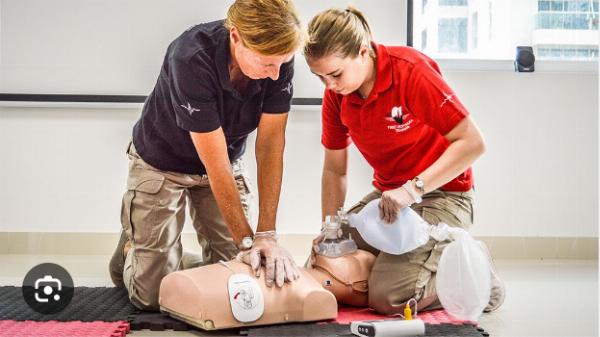Top 10 Reasons Why Healthcare Providers Need BLS Training

Strong 8k brings an ultra-HD IPTV experience to your living room and your pocket.
The world of healthcare is rather fast paced and acquiring the necessary skills to competently respond to emergencies can make a huge difference. Healthcare providers must possess several crucial skills, among which one is Basic Life Support training. BLS for healthcare providers involves and includes Basic Life Support courses for nurses, EMTs, doctors and paramedics.
In this blog we will explore the top 10 reasons why healthcare professionals mandatorily need BLS training, which also happens to be an invaluable asset for them.
What are the top 10 reasons why Basic Life Support is mandatory for healthcare professionals?
Basic Life Support (BLS) training is a fundamental requirement for healthcare professionals. This is constant across various specialties and disciplines. In the dynamic and unpredictable environment of healthcare settings, the ability to respond promptly to medical emergencies can mean the difference between life and death. Let's explore the top 10 reasons why BLS training is not just mandatory but essential for healthcare professionals:
Immediate Response to Cardiac Arrest: BLS training equips healthcare professionals with the skills to initiate CPR promptly in the event of cardiac arrest, increasing the chances of survival for patients.
Maintaining Vital Organ Function: BLS techniques such as chest compressions and rescue breathing help maintain blood circulation and oxygenation, preventing irreversible damage to vital organs during emergencies.
Preventing Brain Damage: Effective BLS interventions ensure continuous oxygenation to the brain. This stabilizes patients suffering from strokes and minimizes the risk of neurological damage.
Enhancing Team Coordination: BLS training promotes effective communication and teamwork among healthcare providers during emergencies. This facilitates coordinated efforts to stabilize patients and deliver optimal care.
Ensuring Workplace Safety: BLS training benefits patients and also ensures the safety of healthcare professionals. A comprehensive training provides the necessary skills to handle medical emergencies effectively. This minimizes risks and mitigates potential hazards in the workplace.
Meeting Regulatory Requirements: Many healthcare regulatory bodies and accrediting agencies mandate BLS certification for healthcare professionals as part of licensure and accreditation requirements, ensuring compliance with industry standards and guidelines.
Improving Patient Outcomes: Several studies and reports have shown that timely Basic Life Support interventions can significantly improve patient outcomes. This greatly reduces mortality rates along with enhancing the quality of life for survivors of cardiac arrest and other medical emergencies.
Preparedness for Critical Situations: BLS training prepares healthcare professionals to remain calm and composed during high-stress situations, enabling them to make rapid and informed decisions in critical care scenarios.
Empowering Healthcare Providers: BLS training empowers healthcare professionals with the confidence and competence to take decisive action in emergencies. This instills a sense of professional fulfillment and satisfaction in their ability to make a positive impact on patient outcomes.
Saving Lives: The most compelling reason for BLS training is the opportunity to save lives. Healthcare professionals equipped with BLS skills have the potential to intervene effectively in life-threatening emergencies, serving as frontline responders and champions of patient survival.
What are the modules covered in BLS courses that are important for healthcare providers?
Basic Life Support (BLS) courses equip healthcare providers with the skills and knowledge to respond effectively in emergencies. These courses cover a range of modules. They are crucial for healthcare professionals, as it helps them provide timely care to patients in critical situations. Let's explore the key modules covered in BLS courses that are particularly important for healthcare providers:
CPR (Cardiopulmonary Resuscitation): CPR is a foundational skill taught in BLS courses, focusing on the correct techniques for performing chest compressions and rescue breathing to maintain blood circulation and oxygenation in patients experiencing cardiac arrest.
AED (Automated External Defibrillator) Use: BLS courses teach healthcare providers how to operate an AED safely and effectively. This module covers the steps for proper placement of AED pads along with recognizing shockable rhythms.
Airway Management: Proper airway management is critical in ensuring adequate oxygenation and ventilation in patients experiencing respiratory distress or obstruction. BLS courses teach techniques for opening and maintaining clear airways, including head-tilt-chin-lift and jaw-thrust maneuvers.
Choking Management: BLS courses include training on how to recognize and respond to choking emergencies in patients of all ages. Healthcare providers learn techniques such as the Heimlich maneuver and back blows to dislodge obstructing objects from the airway.
Assessment and Recognition of Cardiac Arrest: Healthcare providers are trained to recognize the signs and symptoms of cardiac arrest, including the absence of pulse and responsiveness. It emphasizes the importance of rapid assessment and initiation of CPR.
Team Dynamics and Communication: Effective communication and teamwork are essential in managing medical emergencies. BLS courses teach healthcare providers how to work collaboratively in a team environment, delegate tasks, and communicate effectively during resuscitation efforts.
Special Considerations for Special Populations: BLS courses address special considerations and techniques for providing CPR and other interventions to specific patient populations, such as infants, children, pregnant women, and individuals with disabilities.
Legal and Ethical Considerations: Healthcare providers learn about legal and ethical considerations related to providing BLS interventions, including consent, documentation, and Good Samaritan laws.
Post-Resuscitation Care: BLS courses cover post-resuscitation care principles, including monitoring vital signs, providing oxygen therapy, and transferring patients to higher levels of care as needed.
Scenario-Based Training: Many BLS courses incorporate scenario-based training to provide healthcare providers with hands-on experience in applying BLS skills in realistic emergency situations.
Conclusion
BLS for healthcare professionals offers a comprehensive toolkit of lifesaving skills. It helps medical experts administer timely and effective care. Standing as the first line of difference in several critical scenarios, knowing the skills of BLS stands imperative.
BLS training also influences healthcare professionals to fulfill their duty of care with care and commitment. This saves lives and upholds the wellbeing of the society.
Note: IndiBlogHub features both user-submitted and editorial content. We do not verify third-party contributions. Read our Disclaimer and Privacy Policyfor details.



